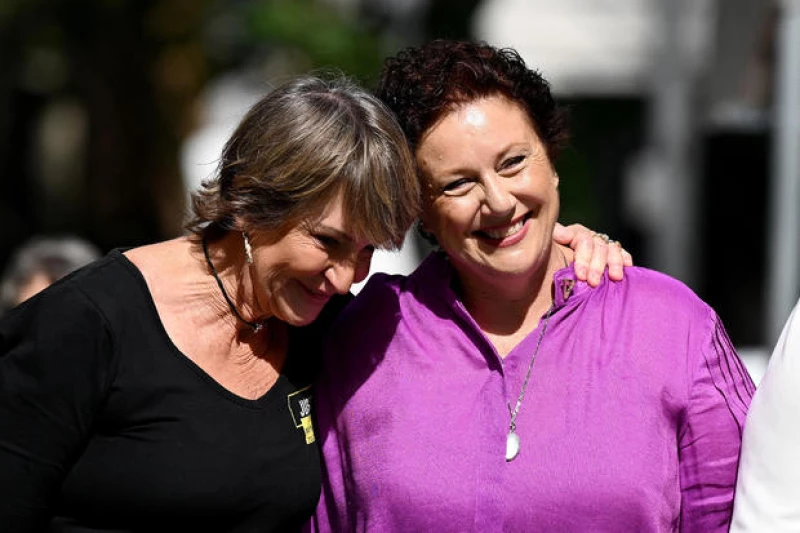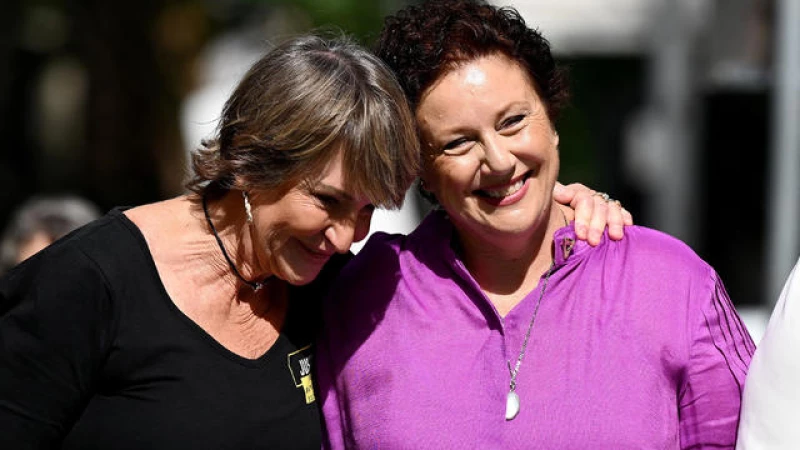Canberra, Australia — An Australian appeals court reversed all convictions against a woman on Thursday, 20 years after a jury found her guilty of killing her four children.
Kathleen Folbigg had already been pardoned at the New South Wales state government's direction and released from prison in June based on new scientific evidence that her four children may have died from natural causes, as she had claimed.

The pardon was seen as the most expedient way to secure the release of the 56-year-old from prison before an inquiry into the new evidence recommended that the New South Wales Court of Appeals review her convictions.
The courtroom erupted in applause and Folbigg wept when Chief Justice Andrew Bell overturned three murder convictions and one manslaughter conviction.
"While the verdicts during the trial were justifiable based on the available evidence, there is now reasonable doubt about Ms. Folbigg's guilt," Bell stated. "It is appropriate to overturn Ms. Folbigg's convictions," Bell added.
Outside the court, Folbigg expressed her gratitude to her supporters, lawyers, and scientists for vindicating her.
"After enduring disbelief and hostility for nearly 25 years, I have finally been granted justice," said a relieved and tearful Kathleen Folbigg.
Expressing her gratitude for updated science and genetics, Folbigg stated, "These advancements have provided me with answers regarding the tragic deaths of my children."
However, she lamented that during her trial, the evidence suggesting natural causes for her children's deaths was either disregarded or dismissed. "Instead of acknowledging the heartbreaking reality that children can and do die suddenly and unexpectedly, the system chose to place blame on me," Folbigg revealed.
Craig Folbigg, Kathleen's former husband and the father of their four children, who initially raised suspicions leading to the police investigation, is now advocating for a retrial.
"To ensure fairness, it is crucial to present all of this so-called fresh evidence before a jury and allow them to determine her guilt," stated Danny Eid, Craig Folbigg's lawyer.
Rhanee Rego, Kathleen Folbigg's lawyer, announced that their legal team would be seeking "substantial" compensation from the government for the years she spent in prison. Folbigg had been widely portrayed as Australia's most notorious female serial killer.
The inquiry, which recommended Folbigg's pardon and acquittal, was initiated following a petition signed in 2021 by 90 scientists, medical practitioners, and professionals in related fields. They argued that significant new evidence indicated the children likely died of natural causes.
Between 1989 and 1999, a woman named Kathleen Folbigg experienced the tragic deaths of four of her children. Her first child, Caleb, was born in 1989 and sadly passed away just 19 days later. The jury determined that this was a case of manslaughter. Two years later, her second child, Patrick, died at the age of 8 months. Following this, her third child, Sarah, passed away at 10 months old. In 1999, Folbigg's fourth child, Laura, died at 19 months old.
In 2003, Kathleen Folbigg was convicted and sentenced to 30 years in prison after prosecutors argued that she had smothered her children. However, new evidence emerged in 2018 that shed doubt on this conviction. It was discovered that both daughters, Sarah and Laura, carried a rare CALM2 genetic variant that could have potentially caused their sudden deaths. Additionally, experts testified that Laura's death could have been caused by myocarditis, an inflammation of the heart, while Patrick's death may have been linked to an underlying neurogenetic disorder.
The revelation of these scientific explanations undermined the prosecution's case, as it challenged the notion that the deaths of the three siblings were indicative of a pattern of behavior leading to Caleb's alleged manslaughter.







